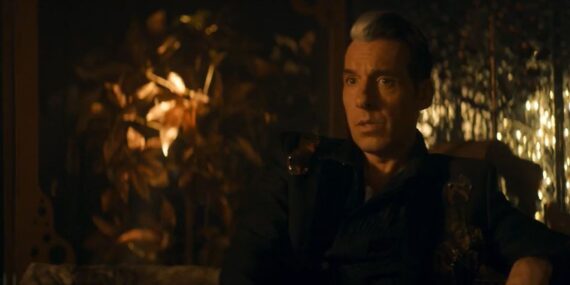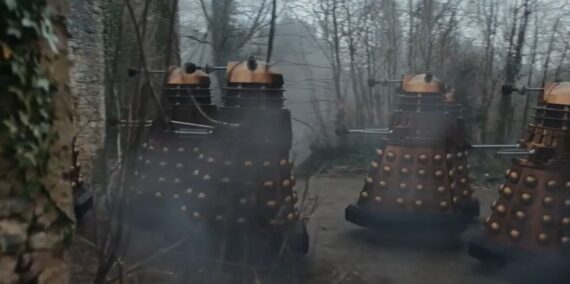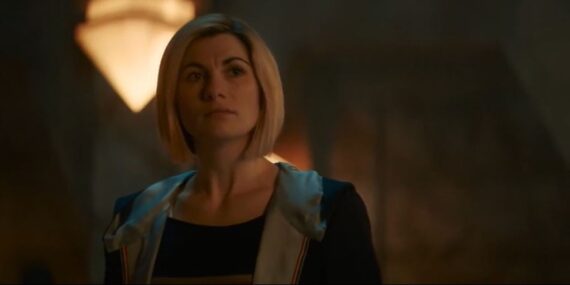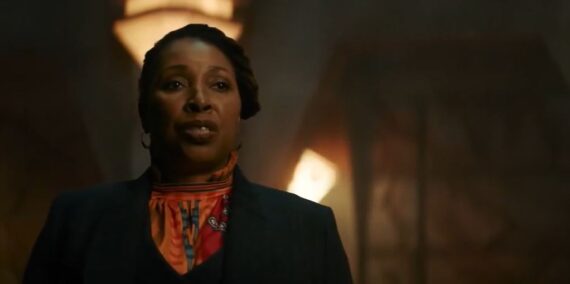Doctor Who: Flux “Chapter Three: Once, Upon Time” Review – What the Bel?
Clint Hassell gives his SPOILER-filled commentary on the third episode of Series 13.

Note: this review contains full SPOILERS for episode 3 of Series 13.
Following a densely packed, though still approachable opener and a mostly self-contained second episode, the third chapter of Doctor Who: Flux, “Once, Upon Time,” grinds the serial to a halt, literally entangling the characters in their own narrative threads.
The tragedy here is that the general form of the story is both novel and illuminating. To save Yaz and Vinder from being killed by the ravages of a time storm, the Doctor hides Dan, Vinder, Yasmin, and herself within each person’s relative timeline. Camouflaged by their own histories, and with a growing sense of surrealism, each character relives seemingly pivotal moments from their past. Theoretically, the plot capitalizes on the adage “show, don’t tell,” providing the backstories of the cast in a more entertaining way than mere exposition. Additionally, as each character struggles to reconcile their memories with their situation, glimpses of the present time ebb into their fever dreams. Vinder sees his former commanding officer as Yaz, while Yaz’s police partner takes the form of the Doctor. The main cast and guest star Jacob Anderson turn in some impressive work, playing multiple roles in succession, with Jodie Whittaker’s portrayal of the hardened Fugitive Doctor being a particular standout. Using the main cast to play multiple supporting roles heightens the sense of confusion for the audience, mirroring the warped reality faced by the core characters – – an example of science fiction at its finest.
However, the conceit does highlight a problem: Flux raises too many questions and provides too few answers. While the scope of the serial is impressive, thus far, the plethora of plot threads serve only to pull the audience’s focus in multiple directions, rather than weaving together a tightly knitted narrative. Many of the plot threads are so thin, they are straining under the weight of Flux’s epic storyline. Despite reaching the halfway point, the serial has yet to reveal what the Flux actually does, much less who caused it, or why. Instead, answers trickle out – – oh, that’s how the Doctor met Karvanista! – – giving “Once, Upon Time” the sense of dragging its metaphorical feet. Does Flux have something to say?

Worse, while the idea of revealing each character’s backstory via tangible flashbacks imbues the episode with a fitting sense of unease, what is actually revealed in each reverie is nigh meaningless. Dan’s storyline divulges little more than that he was once engaged, and Diane appears in his scenes only to remind the audience of her existence, thus raising the emotional stakes when it’s revealed that she is being held captive. None of Dan’s backstory is illuminating, nor is it relevant to the plot. Yaz fares worse, as, after two series, the audience is well aware of her motivation and history. With little to be gained by revisiting her past, “Once, Upon Time” instead uses Yaz’s arc to tease next week’s Weeping Angel-centric episode.

Though Vinder’s storyline is the most cohesive and complete, it does seem like a lot of exposition for a character that lacks agency. To tell the story of Flux, why is the role of Vinder necessary? Vinder is important because he’s the trigger for Bel’s storyline; Bel is important because she is what motivates Vinder. It’s an ouroboros – – a snake eating its own tail – – which is apropos, considering Vinder’s connection to the Grand Serpent.

Given little more to do than bemoan how time is “broken and disrupted” ad nauseam, the Doctor’s storyline is interesting only because of lead actress Jodie Whittaker’s mercurial performance. While the intensity with which the Doctor is suddenly invested in recovering her memories of her previous incarnations seems out of character, Whittaker laces her performance with nuance, subtly revealing how the stress of the Flux is affecting the Thirteenth Doctor. At one moment, the Time Lord displays a deep sense of responsibility for a new companion she hardly knows; the next, she chastises Dan for brazenly rushing into unknown danger to save Diane and berates Yaz for asking questions. Whittaker’s performance is capricious, and the actress disappears into the role of Yaz’s self-centered, satsuma-obsessed police partner as effortlessly as she embodies Jo Martin’s commanding Fugitive Doctor.
Finally, a drawback to the drawn-out reveal of Flux’s central crux is that the dialogue is noticeably wrought. Yes, Doctor Who is a show that uses quotes like, “This could blow a hole in the spacetime continuum the size of Belgium!” to convey a threat that defies conventional physics in a manner imaginable for its audience. However, having not established the true nature of the Flux or of Swarm and Azure’s nefarious plans, the “plot” of Series 13 is forced to use hyperbolic statements that sound ominous but bear little meaning:
“Broken and disrupted time! Everything is corrupted!”
“Time will fracture across all of space!”
“[Swarm and Azure] are temporal poison, or contagion.”
“particles of the time force, tiny fragments of temporal destruction”
Swarm’s speech about “the battle between time and space,” is gibberish. “Time shall not lose. Time shall never surrender to space!” he extolls, absent of context, before exclaiming that his goal is “to reign in Hell.” The lines are supposed to sound ominous and foreboding, but, after three episodes, the grandeur is revealed as the emperor’s new clothes.
Again, the success of Series 13 will be determined by the sum total of Flux, and not by its individual chapters. It is possible that, in revealing the intergalactic scope of Vinder and Bel’s romance, “Chapter Three: Once, Upon Time” provides the character development necessary for an emotionally fulfilling finale. However, at this point, Flux seems so dense with seemingly unconnected storylines that the narrative, and the serial as a whole, is impenetrable to even the most ardent of fans.
Random Musings:











(Time) Capsule Review
Trapping the central characters within their relative pasts allows “Chapter Three: Once, Upon Time” to reveal details about each person’s backstory in an interesting way. However, only Vinder and Bel’s storylines feel complete or illuminating, and they only seem pivotal to the plot in how they relate to each other. Though Jodie Whittaker’s mercurial performance belies an immensely talented actress – – her seemingly effortless, Martin-esque turn as the Fugitive Doctor being a standout – – she is stymied by Flux’s increasing use of hyperbolic dialogue conveying that “time is broken!”
If you’d like to interact with the author of this article, follow him on Twitter @ClintHassell.








